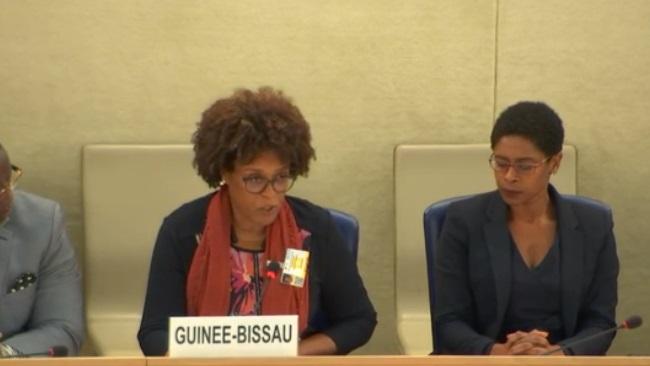Included in the final reportto refer to the timely submission of reports to treaty bodies; addressing corruption, impunity, undertaking reforms (constitutional, judicial, SSR); establishing a national human rights institution compliant with the Paris Principles; implementing Terra Ranka and the Conakry agreement; addressing issues related to freedom of expression and peaceful assembly, health, education, maternal and child mortality, malnutrition, climate change, sexual and reproductive Rights, harmful practices, forced marriage, force begging and human trafficking; the protection of children, food security and climate change; and transnational organized crime, including drug trafficking. Other recommendations included to adopt and implement a comprehensive Transitional Justice and Reconciliation Plan; to fight discrimination & violence against women; to ban female genital mutilation, domestic violence, child marriage and forced marriage.
Guinea-Bissau, for the third time, engaged with other Member States during the interactive dialogue of the Universal Periodic Review, which took place on 24 January 2020 at the Human Rights Council in Geneva. The Universal Periodic Review (UPR) is a unique process which involves a review of the human rights records of all UN Member States. The UPR is a State-driven process, under the auspices of the Human Rights Council, which provides the opportunity for each State to declare what actions they have taken to improve the human rights situations in their countries and to fulfil their human rights obligations.
The Minister of Justice and Human Rights, Ms. Ruth Monteiro, headed the delegation composed by Mr. Vasco Biague (Legal Adviser of the National Popular Assembly and Adviser to the MoJHR) and Mrs. Fatumata Jau (Adviser to the MoJHR). The delegation answered a number of advanced and ad-hoc questions during the review, which was based upon three reports, the National Report, the Compilation of UN information, and a Summary of Stakeholders' Information. UNIOGBIS provided technical support to a wide variety of stakeholders for their submissions, the Government for the elaboration and validation of the National Report, the United Nations Country Team in Guinea-Bissau in its submission for the Compilation of UN Information Report, and civil society organizations coordinated by the Human Rights Defenders Network for the Summary of Stakeholders' Information.
In its closing statement, the Minister of Justice highlighted that “each of these recommendations will be studied and assessed in detail”. The Minister further emphasized that “the decision of each recommendation shall be the outcome of consultations that we will have with a range of sectors of the public administration and civil society. We will have an open dialogue with all those stakeholders that are interested in promoting and protecting human rights. We will be communicating the results of our analysis during the 44th session of the HRC in June 2020.”
75 States participated in the meeting of 24 January. The 197recommendations made by 79 States to Guinea-Bissau included in the final report to refer to the timely submission of reports to treaty bodies; addressing corruption, impunity, undertaking reforms (constitutional, judicial, SSR); establishing a national human rights institution compliant with the Paris Principles; implementing Terra Ranka and the Conakry agreement; addressing issues related to freedom of expression and peaceful assembly, health, education, maternal and child mortality, malnutrition, climate change, sexual and reproductive Rights, harmful practices, forced marriage, force begging and human trafficking; the protection of children, food security and climate change; and transnational organized crime, including drug trafficking. Other recommendations included to adopt and implement a comprehensive Transitional Justice and Reconciliation Plan; to fight discrimination & violence against women; to ban female genital mutilation, domestic violence, child marriage and forced marriage.
States recommended Guinea-Bissau to safeguard freedom of speech and freedom of assembly, to investigate to investigate excessive use of force by the police, to decriminalize defamation, and actively fight corruption, as well as to ratify various legal instruments such as the Rome Statute of the International Criminal Court, and the Optional Protocols to the International Covenants on Civil and Political Rights and on Economic, Social and Cultural Rights, the Convention on the Rights of the Child, and Convention against Torture, all of which allow citizens to present communications to the respective treaty bodies, on alleged violations to the rights recognized therein.
The Report of the UPR Working Group was adopted on 28 January 2020, a draft version containing the recommendations is available [here ->upload attached report], the full version will be available at: https://www.ohchr.org/EN/HRBodies/UPR/Pages/GWIndex.aspx






